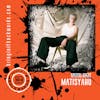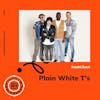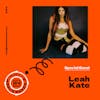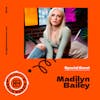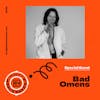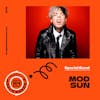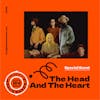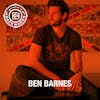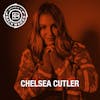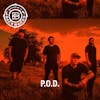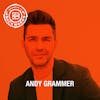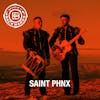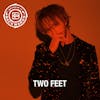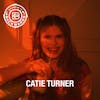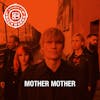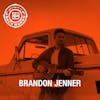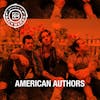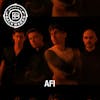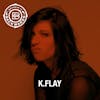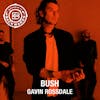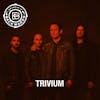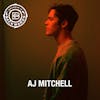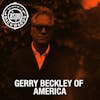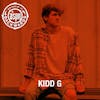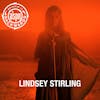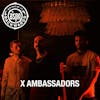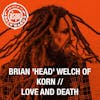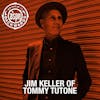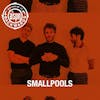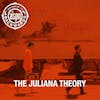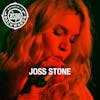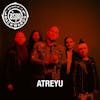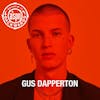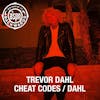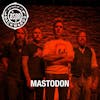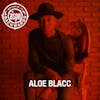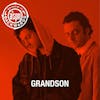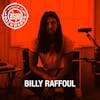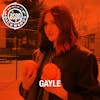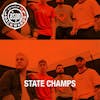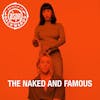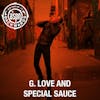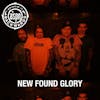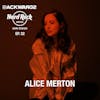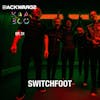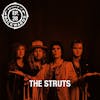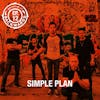Interview with RXPTRS
We had the pleasure of interviewing RXPTRS over Zoom video.
Bristol, UK-based band RXPTRS — who blend rock, metal, punk, and hardcore with a seamlessness that is enviable, creating something that is unique that seethes with boundless energy — have...
We had the pleasure of interviewing RXPTRS over Zoom video.
Bristol, UK-based band RXPTRS — who blend rock, metal, punk, and hardcore with a seamlessness that is enviable, creating something that is unique that seethes with boundless energy — have released their new album Living Without Death's Permission, out now via Metal Blade Records.
When it came to starting work on their debut full-length, the majority of the writing sessions were a "lockdown lock-in." Due to the pandemic, RXPTRS were unable to get together in the rehearsal room as they would have otherwise. However, three of the members live together, which made things a little easier, and they would bounce tracks around between them via email, before the restrictions were finally lifted and they could all be in the same place.
The album was recorded, mixed and mastered by Oz Craggs at Hidden Track Studios in Folkestone, who the band has worked with since their 2019 debut EP, having a great rapport. COVID again had an effect on the recording sessions, limiting the number of people who could be in the studio at any one time, but they placed their trust in one another and Craggs to get the best possible results. This all ultimately worked out in their favor, delivering a record that will introduce the wider world to RXPTRS and open their eyes to what this young band is capable of delivering. Looking to the road ahead, Leworthy sees "blood, sweat and tears, and not all our own" while Roach says, "I feel like this is just the beginning. Our most recent track has put us in the ears of more and more people worldwide, and we can't wait to get in front of every one of them at a live show. We have a hell of a lot to say, and we'll be like juggernauts until we say it all."
We want to hear from you! Please email Tera@BringinitBackwards.com.
www.BringinitBackwards.com
#podcast #interview #bringinbackpod #RXPTRS #LivingWithoutDeathsPermission #NewMusic #zoom
Listen & Subscribe to BiB
https://www.bringinitbackwards.com/follow/
Follow our podcast on Instagram and Twitter!
https://www.facebook.com/groups/bringinbackpod
We'd love to see you join our BiB Facebook Group.
What is going on?! It is Adam. Welcome back to bringing it backwards. A podcast where both legendary and rising artists tell their own personal stories of how they achieved stardom. On this episode, we had a chance to hang out with Simon from the band Raptors over zoom video. Simon was born in west Wales and he lived there for a while. Ended up moving to the middle of Wales, still kind of in the sticks, as he says, he moved away from there. When he was 16 to go to school, he became fascinated with music around 15, 16 years old, played in different bands, growing up different variations of what became Raptors in this band started in 2018. 3 (2m 8s): He talked about this major tour that they got on before they had any music released, putting out their first EAP, having the pandemic hit, having one song, kind of in the bag, ready to go at any point. And they released it. That song ends up drawing the attention of metal blade records who eventually signed them like via zoom. Simon talks to us about the new record. They have coming out the process of putting that record together and the process of getting signed to metal blade during a pandemic and all about the new record called living without deaths permission, you can watch our interview assignment on our Facebook page and YouTube channel at bringing it backwards. It would be awesome if you subscribe to our channel like us on Facebook and follow us on Instagram, Twitter, and tick-tock at bringing back pod. 3 (2m 56s): And if you're listening to this on Spotify or apple music, Google podcasts would be awesome. If you follow us there as well and hook us up with a five-star review, 4 (3m 5s): We'd appreciate your support. If you follow and subscribe to our podcasts, wherever you listen to podcasts, 5 (3m 11s): We're bringing it backwards 3 (3m 13s): With Raptors. 5 (3m 15s): Hey, 6 (3m 15s): Hey, 5 (3m 16s): Hey, what's going on, man? 6 (3m 19s): How you doing my man? 5 (3m 21s): I'm doing, I'm doing great, man. I appreciate you doing this. 6 (3m 24s): No problem at all. Thank you for having me. 5 (3m 26s): Sure. I'm Adam. And this is about you and your journey and music. And we'll talk about the new Raptors record. 6 (3m 33s): Fantastic signs. Great item. 5 (3m 36s): Cool. Cool. So first off, I guess, talk to me about wherever you're born and raised 6 (3m 43s): Sweet. So I was born in there, out in the sticks in Wales. So it's safe west Wales. So I, yeah, I grew up on the coast in, in the far reaches, so I'm not too far away, but by three and a half hours away from where we are now. 5 (4m 5s): Okay. Are you in the year? So you're in the UK right now? 6 (4m 8s): Yes. 5 (4m 10s): What time is it like 3:00 AM or something? 6 (4m 12s): No, no way. We're only on eight, 8:00 PM. 5 (4m 15s): Oh, okay. I wasn't sure how much different it is. 6 (4m 20s): Some would say it's happy hour, but 5 (4m 23s): Hi, there you go. Okay. So you're only about eight hours ahead of me. Well, what was it like growing up there? It wasn't you said west Wales. 6 (4m 31s): West Wales. Yeah. So it is, it's a, it is a Haven really. It's really, really nice. I actually only spent three years of my life there before, before my family have moved around so, so much, but it is, they've actually gone back there now. So that's where like my parents and stuff are, but it, it it's really, really nice, but it's so quiet. It's, it's picturesque. It's beautiful. There's a lot, a lot of nice beaches that are completely deserted. It's kind of like an untapped secret Haven that just no one, it, no one in England even knows where it is. 5 (5m 13s): Literally. You would think that if it's on the coast that people would be all over it. 6 (5m 17s): Yeah. The thing is like everyone in England knows Cornwall, which is west of England. So people just don't go across because it's so out of the way. And it's so the roads and stuff to go there are, if there's no like motorways or anything, it's, it's really, really unreachable. So it has that going for it. It's really, really beautiful and like picturesque. And if you want to escape that, it's really nice. But like growing up there and trying to find careers like my parents and what not, there's just, there's just, there's nothing there. It's, it's so rural. 6 (5m 57s): So, so they moved when I was quite young to, to more of the sticks in mid Wales. So it was, 5 (6m 6s): Oh, really? So you just moved from the S one, one rural, rural area to another. 6 (6m 11s): Yeah, yeah. It's if you're trying to create crazy. My, my mum was a teacher at the time. My dad was a carpenter, but they're, they they've kind of scaled up their, their careers, but they, yeah, they just wanted a change of scenery and they w they went into, to the middle of Wales, which is where I spent sort of my time from when I was about three to about 16. And that, that also was limiting. So I kind of, I got quite fed up at early age where I left home, as soon as I could and start side my side, traveling around a little bit 5 (6m 57s): Where you are now. 6 (6m 59s): Yeah. Yeah. So, yeah, I studied, studied for a couple of years down in Plymouth, and then we in another band that I was in at the time we moved to Bristol because Bristol has always had a really good music scene. It has got yet notorious bands, like massive attack and like sorts of big bands to come out of here. So we really wanted to, to, to come, come here, it was either here or London and London is just so, so expensive that we could literally couldn't afford to live in London. So we, we moved from Bristol, which was, yeah, it's, it's really like the music scene, the boys here. 6 (7m 44s): And then, then yeah, this, this is kind of where we're wrapped as kind of came in soon after that. 5 (7m 51s): Okay. Well, real to rewind real quick here, if you don't mind. Well, how did you originally get into music? 6 (7m 58s): So Tom we'll start with in, in, in high school where there was not a lot to do. I it's, it's hard to explain without, with H like showing you how, how in the middle of nowhere there, the population was probably probably around like only a couple of fives and it's really, really small. And so it was, there was not a lot to do. And then again, to the teen years, it was like, you've got get wasted or you get into the arts or for the, for the, for the first sort of time before I discovered alcohol, I just used to literally just go running. 6 (8m 46s): And they, this is why I spent my time doing, because I just had so much energy, but 5 (8m 52s): I just gotta run, 6 (8m 54s): Run running around the field. So yeah, it'd be like, there goes the 5 (8m 59s): Running guy again, 6 (9m 1s): Very Forrest Gump. 5 (9m 5s): Yeah. 6 (9m 6s): Then I started finding the arts probably when I was like 13, 14, and I started enjoying doing art ha went to my first show around then. So I was about 13 or 14 traveled miles and miles to, to our nearest kind of venue. I'd actually was lucky enough to see incubus. Yes. We went to see that like Carta for Reno is by two, two and a half, three hours away. But like we had, we had a group of like older friends who could drive and, and they, they took us down and got to see it. 6 (9m 46s): Yeah. A good, good show at quite a young age. And yeah. 5 (9m 50s): What were they pretty big at the time when you saw them? Or 6 (9m 55s): That was probably around the CRO left the murder album. 5 (10m 2s): Okay. Yeah. So yeah, they had six shots on that second after that second record. Right. Okay. 6 (10m 8s): So yeah, they were a good size and yeah, so that was, it was like overwhelming to go from like tiny little town. And I hadn't even seen a local gig before and went straight into that. And there was just like 5 (10m 23s): More people than your whole town 6 (10m 28s): Theory that there is literally that, that was the case. And so that seeing Brandon Boyd doing his thing was just kind of mind blowing. And I was like, I can get, get, get involved in that. So start started doing little like jam bands and in, in middle, like middle of high school 5 (10m 49s): As just the singer, or did you play guitar or anything at that point? 6 (10m 57s): Yeah. I, I, my mum had an acoustic guitar. I had a 12 string, which I've still got just over here, which is a hand me down. So like generations. So I've, I've kept that one safe here, but that's where I caught you. I started kind of having to play, but I was, oh, it's just a live guy with the energy. So probably not the most tuneful back then, but I gave it a good shot at singing and yeah, we just kind of stayed, stayed behind after school. We had one teacher that we really got on with and they just gave us the keys and like left us to our own devices, which was really, really cool. 6 (11m 39s): She, she was great. She was really cool. I've still, still got home and Facebook as well. It's straightened out. 5 (11m 44s): That's amazing. She probably sees now that like, you know, you're doing this and you know, you're six, you have success at it. That's probably really cool for, 6 (11m 53s): Like, I 5 (11m 53s): Remember when I let him go play like jam in the room just for afterschool. 6 (11m 60s): Yeah. I literally, like, I can remember that noise, that rocket to like, keep us away from getting into any trouble really. But it was a, yeah, she was really sweet and yeah, they thought that that was where it kind of began. And we started started Germans, started doing some like local shows and yeah, it kind of just carried on doing that for years, many, many years, really. 5 (12m 31s): And were you like, that was a band you had in high school, but like where you, you said you moved around quite a bit right after, were you going to school for music? You, you said you ended up going to school for a bit and then also just moved around quite a bit. Were you pursuing this the whole time? 6 (12m 47s): Yeah, like basically it was always there on the side. So I'd, I, I did the, the Mo moved around a little bit and ended up going to university to study film actually. So never, never actually studied music. I've never had any form of musical training or anything like that. It's always been a passion, but yeah, I've always been studying other things like we're studying psychology and in college and then gave that up and wanted to do media and pursue those arts and was constantly doing music on the side. 6 (13m 29s): And it just got to a point where the music was taken over. Like I was, I was paying way more attention to music than any of everyone kind of asked, like, why didn't you just study music? And I was like, I never wanted 5 (13m 44s): To, I loved it. You know what I mean? 6 (13m 47s): This is the thing, like when, when it got to basically everything that I ever really, really loved and really put like stuff into when I became that kind of forced side, like I loved reading in, in school, on, on the side. But as soon as someone was like, you have to read this, I all of a sudden was like, it's like, like the, 5 (14m 11s): Like there was psychology 6 (14m 15s): And I'm like, do I even run in the, like, I became, like, I w I run in as, as a, as a young kid. And, and through like 13 and 14, I was running around the field. I actually got, I ended up in the national team for, for athletics, 5 (14m 31s): Blah, like cross-country or track or sprinting. Wow. 6 (14m 37s): Okay. It's those 102 hundred meters. And I, and I became like obsessive ever since I do, I go in full for it. And yeah, I ended up doing 102 hundred meters for the country. And now I was still only like 15, 16 at that point. And so I was doing that. And then all of a sudden that's something clicked in my brain there where it lost the fun, it lost the joy, because I had people just that I was training five, six times a day and then five, six times a week. And then, and then like performing at the weekend grand Prixs and all at the, all these national events. 6 (15m 20s): And yeah, the, the, the fun kind of got sucked out of it. Like I D I didn't want to do that with music. I didn't, I like music was the lifeblood through all of it. I've always, always loved music, always had keen, keen ear for it, and really loved like the theatrical and really just enjoyed it on the side. It was kind of my escape, but yeah, as it happens, it, the, the scale kind of flipped moved on. 5 (15m 54s): So then did you move to Bristol with this band? Or, or were you, why, why did you choose there? I mean, you said it was a music city, right? So like, did you move there with another band or did you move there to join a band or just moved there with the intent that I could probably do music here, because it's the thing 6 (16m 12s): It was with another bond. Okay. So, so we, we were living in science, Western England in place called Plymouth. 5 (16m 22s): And that's where you said you went to school, right? 6 (16m 24s): Yeah. Yeah. So we were doing reasonably well on that circuit, but there was just nothing much there at the time as it happens, it's actually come up the scene down there is really cool now, but at the time it was, it was just nothing really going on. So we all collectively decided to move to Bristol to kind of get involved in that scene. But it was soon after that, that actually that the project ended up breaking down anyway, as our drama got snapped up and to assign band, and it just, they all went pear shaped, and we sure very bitter about it, but we kind of all kind of separated into, into kind of different projects. 6 (17m 11s): And some people just stopped doing it. And from that, that is where I actually met Ian, who is now the guitarist interrupted. 5 (17m 23s): Okay. So you met him in that banner. You just met him after the band disbanded 6 (17m 29s): The median and the guitarist from the old band. We, we wanted to continue working together and we were like, let's get another guitarist involved. And Ian was actually in another project. So he had, he was looking for a singer and I w I was there with my best friend at the time. And we were like, well, we come as a package coming along as well. And so, yeah, so we started, started a band together and I've, yeah, I've been working with Ian since, since that. 5 (18m 6s): So then that band you guys had then again, D fizzled out or something, and then rappers started after that. 6 (18m 13s): He S yeah. Okay. 5 (18m 15s): So what year do you start this band? 6 (18m 17s): It's the best, best band started in 2018. 5 (18m 21s): Okay. 6 (18m 23s): So yeah, still, still relatively, relatively young cause getting are in two years of that, was it unlocked? 5 (18m 29s): Right? I know exactly. That's, what's crazy to think. You're like, well, we started the band five years ago, but we've only really had like less than three to do it. 6 (18m 38s): Yeah. It's yeah. It's it was, it was insane as well. Cause yeah, we, we all had different projects that the band Raptors, we all knew each other from this scene. It sounds very incestuous. First of all, it's quite a big place, but we were all just, 5 (18m 58s): Well, that's kind of what happens, right? I mean, if, if you're hanging out with people in the same genre or, you know, people are going to the same shows, I mean, I see that you see that happen all the time, no matter what city you're in. 6 (19m 7s): Yeah, absolutely. And yeah, the ma Matt and Holly who were in the band, they, they were in university together and they, they started to bond as well. They, they went to a music institution and so they were kind of doing function bands and stuff together. So those two knew each other, but were in separate bands. Some had been in another band with Holly as well. I mean, Ian was still, we then became the two, some that were joined at the hip. 6 (19m 47s): And we, we could see that the project that we were in was kind of dying down and we had all been in support bands or we'd gone out on tour with any number of the other guys, decided if their stuff was kind of going safe, why, why not start writing some tunes together and see what happens? And we had a good feeling cause we just all hung out and went drinking. And just as casual mates anyway, that's, that's half the battle. 5 (20m 22s): Right, right. Finding a four or five people that you can actually get along with for a week straight or something like that. 6 (20m 29s): Yeah. Yeah, exactly. It's it's once you've got like the same sense of humor. Oh, I like the same kind of some sort of crossover with musical tastes and a similar kind of work ethic. I think work ethic is a huge one because we've had bands where, or in so many projects where it would be like two people I are absolutely gunning for and they want to make this like their life goal. Then the other guys are just like, they like music, but it's kind of like a side thing. Or if there's a gig, they'll go to it. 6 (21m 11s): It's that, that kind of like, and I do believe that even if there's one person like that, where they're not pulling their weight or everyone's not steering the ship, everyone's not rowing at the same time, then it's some something's going to go wrong eventually. 5 (21m 28s): Oh, for sure. And I think that's why it kind of gets incestuous, as you said, because the there's all these bands happening that are breaking up for various reasons. But maybe I would, I would guess a lot of it has to do with not, not work ethic, but like for the priority of the project versus other things in their life. I mean, if you're in a band and three guys are going to college and one guy just got married or, you know, one guy's pursuing a career in like economics or finance. And then it's like, well, if you land a job making money, probably not gonna put this first, whereas our band, this band and that band, there's a, you know, a couple of people from each one of these that this is it, this is all they have their, their sights set on and well, let's all get together. 5 (22m 14s): And if you gel obviously, but like, I mean, I can see how that all happens, 6 (22m 18s): But yeah. A hundred percent and yeah, there's never any kind of bare feeling towards it. It's just when it's, when you're in it for life and you're in it with, with that goal then yeah. You need, you need kind of parts. You need, you need everyone in the, in the same engine to be running at the same speed. And yeah, it, it took a lot of iterations, but it was, yeah. It, it, it, it just clicked and it was, it just a good feeling once it all came together. 5 (22m 53s): That's amazing. And so the band gets together in 2018, you put a record out in 2019, I believe, right? 6 (23m 1s): Yes. 5 (23m 2s): And with that album, like, was that writing process different than any other band you had been in before or, and, and like, yeah. Tell me about that, I guess. 6 (23m 13s): Yeah. So I'd 5 (23m 14s): Ask you a follow-up question to the same question. 6 (23m 19s): It was, it was, yeah, it was a really good thing. It was just, it was just an EPS that we, we basically, in the first year we just focused straight on. After about two months we got straight on onto the road. 5 (23m 33s): Oh, really? Okay. So you didn't sometimes it's the other way around? I was just curious. Cause was, I mean, the record came out in 40 19, so right away you were like, okay, we're together. We have some songs let's just start playing, playing them out to everyone. 6 (23m 46s): Yeah. Like games a hundred percent. And if we want to hit, hit the ground running and we, we wanted to kind of hold back on a full release until we kind of had some like proper PR interest. And we, again, we've made so many mistakes. We've made them all in these previous projects with Russian releases and, and go into the studio too quick and like chip like churn and stuff. And it kind of fallen on deaf ears and there was like more disheartened in that way. So we were like, let's build a core following. 6 (24m 25s): Let's see what we really are about. Let's find, I think that's where we found our sound one for bad term. Like we, we wanted to see what Raptors was all about. So we, we wrote a handful of songs. I think we were still doing like a cover and we had to buy five songs and like a cover. And we were just like anyone anyone's a bio takes on tour. And we looked at massively with some really good friends of ours that we, we had known from other projects. And unfortunately they were coming to the end of their, their road. 6 (25m 11s): And if you want a farewell tour and we had obviously just started and they were like, well, passing the torch, so to speak. They were like, well, you can come on tour and open for us. And yeah, you can come out and see. And honestly, it was such a huge mark respect for, for those guys to do that. Because some of those people that we met on those first shows are still like massive funds now. And I, it was a really cool, cool, cool moment. And our first ever gig was not even in this country, you like, we played it. 6 (25m 55s): We played in, in Scotland in our first show. So just, it was really kind of bizarre and not, not the, not the norm to do it. We hadn't played a hometown show. We hadn't done anything like that. We went straight to Glasgow, played a show and all of these rooms were like packed to come and say bye to, to the bank or speak in the shadows. And we, yeah, we got to do like a full, it was like pretty much two weeks tour, straight, straight off the bat. Yeah. Just with this, just with this handful of songs, 5 (26m 35s): You didn't have anything recorded. So at that point, when you get back, now you have all these probably people that are like, oh, Hey, like I saw you in Glasgow. I saw you in wherever. And like, now you can be like, oh yeah, here's our record. Or here's our EAP 6 (26m 49s): That was done with the full, the full intent of the first year was just, yeah, get ourselves soy, really align with what we're, what we're going for. Hit the road, get as many shows under the ballot as we can mainly just open it up. Well, we were happy to go on whatever time, whatever stage and, and meet some new people. And, and then kind of then yeah, get getting a following really road test the songs as well. Like we found such cause we, we always claim and our biggest kind of a motto to ourselves is that where our live band first and foremost, and, and everything else is kind of 0 (27m 36s): Bank of Clark county has a comprehensive suite of solutions for your personal and business needs. We offer banking, lending services and wealth management services. With the best in class customer service you'd expect from a community bank, whether you need a checking or savings account, a mortgage or home equity line of credit, a business loan, or to set up a trust or investment account bank of Clark county can help bank of Clark county, big bank solutions, community bank service. And we've just opened a branch at five 30 Blackwell road in Warrington member. MDIC equal housing lender, 6 (28m 6s): Secondary as such. We love every ounce of the whole process, but live where we are alive band. And through that road testing process, we'd written these songs. And before we went into the studio, we completely change them. Like we took the essence of the song, took it on the road. And we were like, okay, well let's bet pops live. Let's let's like, get to that point sooner. Or this song might drag a little. Can't like, can we chop like this middle eight section completely out. It was like a road test in some sort of experience for the songwriting, which was another kind of new aspects that we did. 6 (28m 51s): And it works really well while I like to think so anyway, 5 (28m 55s): Or no. Yeah. And then 6 (28m 57s): You got much stronger for it. 5 (28m 59s): And then you're back. I mean, yeah. You released this record then. And then how long did you ha like what, what month did you put it on 2019? I'm just curious. Cause then obviously the pandemic happens like a year, less than a year. I would imagine after that. 6 (29m 12s): Yes. So what we did, we put it, I, it was a start the summer. It was like April. It was may. It was may 5 (29m 23s): Independently. You guys put it on federally? 6 (29m 26s): Yes. 5 (29m 27s): Okay. You're now on metal blade. I want to talk to you about that cause that's awesome, but okay. Sorry, go ahead. So you independently put on his first record. 6 (29m 35s): So we, we, yeah, we we'd started to, to, to, to put it out. We had this like core following. We hadn't done like an actual lot of PR. We were kind of saving ourselves for that, but we had made some contacts along the way and we were, it was all DIY. It was all self done along with our manager. And we, we put, we put that out in the start of summer in two guys, 19 and then toward like crazy over that summer, like it was nonstop from, from like March until like October. 6 (30m 22s): And then it was just, it was just constant. We've never really any respites. And we were all working as well, which was the mad thing. Like we all, we all had to like continue working day jobs or working as self-employed 5 (30m 38s): While, 6 (30m 39s): While doing this. And just constantly, constantly touring and get gain like a really good momentum ups through festival season where we played a lot of like the smaller kind of festivals, smaller and mid fantasize festivals. And then we went back into the studio to vain in, in October because we'd written like on the road, as we were saying, like, and road tested a couple of new songs. And so we recorded in October then carried on through the winter all the way through Christmas to, to January. And then we released one single in January and then did our final tour before lockdown came and the world stopped. 5 (31m 25s): Sure. Oh my gosh. And then all of that momentum that you'd built is like, Ugh, 6 (31m 30s): I, it was, it was my money. It felt like hitting a wall. It was just like, it was going right up until, and we had stuff book then, and we were, it was really, really kind of hen stride and yeah, we're just constantly on the road and the shows were like insane. And then we stopped, but we had one bullet still left in the chamber and we had one single that again, we had recorded in, in the October before kind of while we were touring. And we put that I a couple of weeks into lockdown because we were alike. 6 (32m 11s): We, we genuinely thought this was, it was going to be like two 5 (32m 15s): Weeks or three 6 (32m 16s): Weeks and then we'll get back out and tour the single. But we, we put it. I, and that, that, that single absolutely went off. 5 (32m 26s): Yeah. You're talking about you. Me and the devil makes three 6 (32m 29s): Asked the one. Yeah. So that, that is what, yeah. Kind of then started turning turn in a few more heads. And I don't know if it, it was like lockdown related, but it just seemed that a lot of people were, seemed to be online a lot more. So it got a whole lot of attention and it's spread a lot, lot quicker than anything that had before. So, and, and that, that song song is the reason we got picked up by Mel Bladen. And 5 (33m 2s): Really, so then they reach out to you like, Hey, like what, yeah. What do you guys got going on? Like, you know, this song is doing, I mean, it has nearly a million plays on Spotify. 6 (33m 11s): Yes. Yeah. So it's, yeah. It, as the story goes, I believe it was Chris Santos who owns and runs BlackLine media and his team picked it up while apparently having a late night session. And apparently that's what he does when he's at home. He has a couple of drinks and relaxes and finds new music. And apparently he came across that and mentioned that to the Melbourne team. And yeah, it went from there. 5 (33m 49s): That's crazy. What a dream come true. I would imagine, 6 (33m 53s): Ah, a hundred percent. It was, it was so, so surreal as well, because it was nothing like how we could have possibly pictured the story, go in as a, as a, as a kid. And like when starting up bands, I always imagined they would be like a live show that you'd get like an a and R guy come in and be like, Hey. 5 (34m 23s): Right, exactly. 6 (34m 24s): Like with a scroll and just like, okay, 5 (34m 26s): That'd be a stop sign. <inaudible> 6 (34m 32s): Hey. But as it happened, it was like, we were all stuck in this house and we were like, it, everything, the whole world felt completely surreal. And, and we had the, these zoom calls where we were going through everything with, with the team and, and, and sorting everything out. And it was over months and months of discussions. And it just, it was just like, oh, this, so this is how this is going down. It was like, so bizarre. Cause they, they, they even said normally they would, they would have just like, yeah, they, they liked that stuff. 6 (35m 13s): They probably would come to a show and it would happen over a drink and like some sort of more, more ceremonies. 5 (35m 21s): Yeah. Right, right. Then it'd be more of a bigger deal than, Hey, so we're on the computer on the other end of the world. Like what's going on? Do you guys want to send a deal? 6 (35m 30s): Yeah, it was, it was so bizarre. We were like waiting at any point for it to just be like this, this is, is this really happening? Like, because I, I don't know if you felt like, it felt like I'm sure you did at certain times, just like, it felt like suspended reality it during, during the lockdown, it was just like, like Groundhog day, like is like, what, what is this like days or Blair and into each other. And 5 (35m 58s): It looks like, is this like so many times I was like, this has gotta be not like this. This has to be fake. Like, this has gotta be some sort of joke. Like just having the, like, just playing the tape forward, thinking like in 10 years, we're still going to be talking about the mass and the, this and that. And it's like, this is something that's never going to go away. Like, it's just, I guess not the mass specifically, but like this virus will always be, it'll be like, oh, bla, bla, bla has strep throat today. You know, it's like going to be the same thing, which is so crazy to think. 6 (36m 32s): Yeah. And the kind of the thing that does kind of some sort of comfort in it is that like everybody, everybody in the whole world has gone through it the same, like sort of like unifying that everyone can talk about how crazy this experience was and like how, yeah. Really like suspended in, in some sort of parallel reality, how it felt like everyone has said the same thing, everyone I've spoken to since I've spoken to people across the world and they're all like, this is, this is absolutely insane. 5 (37m 14s): It is so insane. I mean, w during, that's kind of, when this podcast I'm doing, like really started to do something, I was on terrestrial radio in California for ever for 17 years. And then like, this is like, oh, now no, one's doing anything. Like, Hey, like I already had this going for a bit, but it was never done this way. And then it was like, oh, like this zoo thing is like catching on to everyone. And then it was like, oh, Hey, like let's do an interview over this while I'm sitting in my house doing nothing because we can't leave for whatever. And then now it's like, you're talking, I'm talking to people in, you know, the Netherlands and Australia and in the UK, in New York city or wherever it had to be Canada, it's like, everyone is dealing with the same thing. 5 (37m 57s): And everyone has a similar story of, you know, where they were when the thing happened, what, how that affected them, what, you know, it's, it's also, it's so crazy. Like, it's like, are we living in some like, simulation, like what is happening, 6 (38m 15s): How it was. And there's said days, like, especially with sleep deprivation. Cause I was just like, well, I don't need to go to bed. 5 (38m 24s): Nothing going on Melbourne, 6 (38m 27s): Stay up. And like when, when the right process was happening, I was up for like days on end. Like I, I think probably was like three, nearly four days up with no sleep. Just putting things down and seeing what I could come up with because why not? I might as well see what my brain does when I, when I get to this point, 5 (38m 48s): We do some testing. I slept for four days, what am I going to come up with? 6 (38m 56s): Yeah. It was like, what else am I going to do? I'm never going to get another opportunity quite like that. So I was like, yeah. Let's but it didn't help the whole, is this real? Is this a simulation thing? Cause I, I was genuinely it at some point going, this has gotta be a hoax. Is there, is everyone in on this, this, this show kind of stuff. 5 (39m 18s): Yeah. Then they're going to reveal, like, you're just kidding. 6 (39m 22s): I was like 5 (39m 22s): That funny, man. Well, so you signed with metal blade based off of that song that got the conversation going and then it was okay. Hey, you know that the deal happens, I guess, were you, did you have to present more music to them? Or like, how did that work? 6 (39m 43s): So basically what happened is all areas. It was kind of freakishly. Like I know the whole situation was really screwed up for a lot of people, but I feel bad saying it that, but that the way the lock downs were timed actually worked perfectly for us. We had, we did have, so we had the, we released that song during lockdown. In that time we refined the songs that we would do another recording session. Cause initially those first two songs that we had, we were going to record another five and then we're going to have another session to make the album. 6 (40m 32s): Anyway, we were going to do that regardless of if we were signed or if we were going to do it independently, we were going to start like pitching stuff then. So we were on their radar from that song. But then in that time where nothing, we haven't put pen to paper, there was loads of stuff still to still to do. So we went and recorded as soon as lockdown. The first lockdown ended, we went and recorded half the album That we had five songs in, in this, in this little short time. 6 (41m 13s): And then we did the full pitch and spoke to, to the guys in the a and R guys. And it was at that point where it was like, okay, this, this is going to happen now. So it was between, between like mid summer and like October where metal blade got involved properly. And we had the five songs that they were looking over and it was at that point that we decided that, yeah, it's going to be a full album. And, and we ended up again, various lockdowns and sure. 6 (41m 59s): Everything stopped Stein. We didn't actually get into the studio till early 20, 21 to, to then finish the album. 5 (42m 7s): Okay. And the record's coming out. What, and next month I believe, right. June, 6 (42m 11s): June 24th. 5 (42m 13s): Okay. Living with our desk permission. 6 (42m 15s): That is the one 5 (42m 16s): I love it. They'll tell me about the new one that I, the newest song that you've released in the video and everything is for rock bottom, right? 6 (42m 23s): That is right. Yeah. Rock bottom is the stepping stone, which was super, super fun in every, every element of that song and the video and everything was just super, super fun. It was, it was written again, low as, as most of it was during that, the height of lockdown where my head was beginning to spend when sure. It worked, I kind of, kind of perfectly became, is I think I was genuinely losing my mind during lockdown and all the songs and in their first iterations were so serious and there was so dark. 6 (43m 7s): I was seeing like a lot of things that were making me super angry. And as I do with, with songwriting, I tend to, to write and write, get the, get the song and then I scrap it and then I go, go out again. And I find, that's kind of like how I refine my writing, not being scared to just scrap whatever the first idea is, go out again. And I did this with all the whole album, way more than I normally would because I had more time on my hands. 5 (43m 39s): Was it? Well, that was it more time on your hands. And what about the pressure of metal blade? Like had you signed the deal and we're like, okay, they are cool. They are cool with these five. Like, does that add an extra pressure? 6 (43m 52s): I felt like, because we'd already rock bottom was in the first half. So that was kind of pressure less. There was any pressure that we put on ourselves, but the, the second half I did, I didn't think so. Like I think maybe subconsciously there was like a, some sort of like, oh, we gotta do the best. But like we approach everything in the same, in the same manner, each song that we ever write, the next one has to be, there has to be better 5 (44m 26s): Guide 6 (44m 27s): That that is how we'll always, always go about it. Whether it, if it's in the same style or completely different style, we've got to consider this song stronger than the last. So there the pressure, any pressure that comes, it was never from the, the idea of being on the label. It was more that we put it on ourselves. Okay. 5 (44m 53s): Okay. Yeah. I wasn't sure if you had like, oh, now this, like, are we going to screw this up? Like, I mean, I, you know what I mean? Like, I don't know how that would, how you could approach that in that sense, but that's awesome that, that didn't even run into your mind. 6 (45m 4s): Yeah. It really doesn't because we knew they liked our stuff and they liked it for why it was and who we are. So we knew from that, that how, like, 5 (45m 20s): Let's just keep doing what we're doing. 6 (45m 24s): It could be, it could be track check. If, if you try and please, or like try and do something that you think someone's going to, like, that's probably where a lot of downfalls comes. I think you've got a, you've got to do it for yourself. And it is a, it's a roll of the dice, but it's, it's the most rewarding thing when it comes up. 5 (45m 46s): For sure. 6 (45m 47s): Yeah. It's it's and it's got, it's gotta be yeah. Entirely you. And I think that's why the, the album sounds like it's having an identity crisis because we were all going through so much that we were like, it's gotta be what we're going through. We need it to be human. We need it to be what we're feeling in this moment right now, regardless of how that comes out, whether it's going to be super angry and super heavy, or like if we're dealing with grief, we'll paint that a different picture that way. And as, as it came to with, with certain songs, rock bottom is a stepping stone and being one of them, demons, headphones has been another one where there, the humor element came into it. 6 (46m 35s): And that was from me, winding myself up my own worst enemy. And I was going around in circles and circles. And I was like, oh, this, this particular thing that I'll, I'll tell you what the song is fully about in a second. But it was this thing that was driving me insane. And then all of a sudden I kind of came out myself and was thinking, what the hell am I doing? I'm in a small room and infuriated myself. I was like, I've got a line up. And that's where like the sarcasm kind of came into it. And I really wanted to talk about like a darker subject, but really kind of poke fun into it. 6 (47m 18s): And that's, that's how rock bond came about during, during lockdown. And it was a decision to kind of, yeah. Show a bit of actual personality. I'm not like an angry person all the time. I'd like to see position than that 5 (47m 35s): Angry person at all. That's what's amazing 6 (47m 38s): Is I get to unleash it all, but it's yeah, it was, it was something that drove me crazy. It was, it was from, from the states actually it was, it was something that I had seen going around on social media and it insane. We, we ha we have in the UK as well, but it was a certain celebrity religious figure. Should we say? And this, this guy was on a certain channel asking for money. 5 (48m 12s): Oh, okay. I know like a, okay. I know you're talking about like evangelist or what are they? 6 (48m 18s): Yeah. You got it. And this guy said that he could blow away COVID through your, through the screen. So like donate the money and like come close to your screen and I'm going to blow COVID away. 5 (48m 35s): I 6 (48m 35s): Was like this. So my immediate thing was like, this is hilarious. This is crazy. But then I looked, I did a deep dive into this guy and he's like multi, multi, multi multimillionaire. Like he's got his own like private jet and runway in his house and like crazy amounts of money and not got me thinking like, this is insane because people who are given to this guy and to his channel and his program, that they're not going to be the richer people at the world. Like these are people who are like desperately one in salvation and they're, they're trying to buy their place in the afterlife. 6 (49m 17s): And I fought days, one of the darkest things ever, like when I really, really go into it, I was like, horrible. Like, he's just there, like, yeah, just give me more money. Give me more money. I can just blow it away. It didn't really work. Did it deed? 5 (49m 41s): Maybe it works for the people that donate. 6 (49m 43s): Oh shit. That's 5 (49m 44s): It. See if you have done it, he could have blown right in through your TV screen. 6 (49m 48s): Yeah. Say needed. 5 (49m 54s): Oh my gosh. Yeah. I didn't see that one, but I kind of figured that's what you are going with, like with, with the, yeah. The way you're describing it, but wow. Okay. Yeah. Obviously, so that's, that's what kind of fueled the, the song. 6 (50m 9s): Yes. Yeah. So I was like, I'm going to just have to write a story up by one of those people who is given to this person. And then all of a sudden has that realization of, oh, hang on. I've given literally everything away, 5 (50m 22s): Right? 6 (50m 23s): Yeah. Yeah. That, that's where I kind of, yeah. Find the faster call side of it and kind of had, had a lot of fun with writing it. But at the same time, it was still infuriate into knowing that it's really happening. But like for the video for that, then we were like, we have to recreate this. Like, like, so I was super, super fun to play dresser and together I was like, I can, I can see why they get into this. 5 (50m 54s): Oh, I found it. You're like, I can find my stuff in your career. 6 (51m 0s): A private jet. 5 (51m 3s): Oh, well, that's amazing. I love the songs you have out thus far, the record coming out in a little over a month, are you doing a support or touring it? Like, have you had a chance to do anything like that since 2019 or whatever? 6 (51m 18s): So it is it's opening back up now. So it's only, now that that shows are like full capacity again. So it's kinda, it's kind of working out good timing. It was, it was well calculated from the label to be fair because we were, we were ready to go with that for a long time, but tore in is so important. And I feel like it would have, we have really kind of not enjoyed saying on it or like releasing it and then having to wait until, until now to, to, to, to fully tour. So it's nice day. It's going to be coming out. We're going to be doing an album launch party in our hometown in Bristol. 6 (52m 0s): And then yeah. We're going to be hitting the road soon after that. It's all unannounced at the moment, but yeah. 5 (52m 7s): Okay. Any, any, any chance you're coming over here to the states, 6 (52m 13s): Don is, it's definitely something we're working on and we can't, some people, some really great people I can't mention yet, but they've said that some really cool tours that could happen, but we need, so we need to get everything in alignment, in place for that. If it does come off, it will be dream, dream stuff. 5 (52m 34s): Amazing. Well, Simon, man, thank you so much for, for doing this. I appreciate it, man. I know it's evening at your house and you know, you're taking time to hang with me and I appreciate it. 6 (52m 44s): Ah, I love it, man. Like, yeah. Thank you for having me. It's been awesome to chat. 5 (52m 49s): Cool. I have one more question and then I'll let you go about your evening. I want to know if you have any advice for aspiring artists 6 (52m 57s): A hundred percent. I think if, if I could, I could talk for hours about this. But one, one thing I would say is really kind of be true to yourself. I know that sounds a little bit like overly preachy, but in every aspect it is really follow your gut instinct. How have your eyes on, on trends and whatnot. But if you don't fit in with don't, don't do it completely far. Follow your own gut instincts and hit it hard.
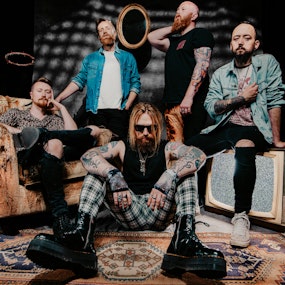
Simon Roach
RXPTRS (pronounced "Raptors") are a new wave of British rock. The energetic quintet combines ferocious grit with an ear for melody. Built upon the backdrop of the UK, the fiercely creative, long-term friends set out with a sonic mission statement to not succumb to a single barrier, to push boundaries and go beyond the limit of genres, creating a raw sound that is unmistakably their own. Each raucous track is laced with lyrical depth as RXPTRS lay it all on the line. They state, "Music is a vessel, this is how we channel the experiences that have shaped us. This is how we bare our scars." Quickly becoming renowned for their explosive live performances, the group's hardcore following continues to grow. Their workhorse mentality towards touring has seen them light up stages across the UK and Europe alongside the likes of Escape the Fate, King 810, As It Is, Light the Torch, and more. RXPTRS' visceral energy continues to infect the population as they cut their teeth on the live scene, with no sign of slowing, they’re truly hellbent on showing everyone the way of the RXPTR.
Featured Episodes
Here are some great episodes to start with. Or, check out episodes by genre.























